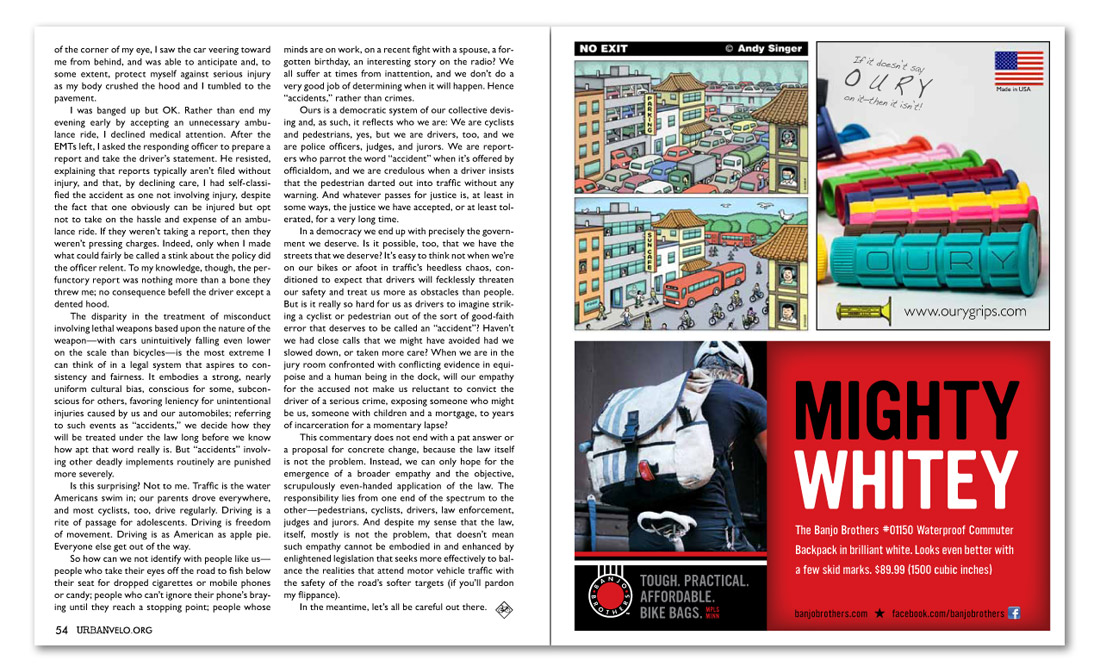


of the corner of my eye, I saw the car veering toward me from behind, and was able to anticipate and, to some extent, protect myself against serious injury as my body crushed the hood and I tumbled to the pavement.
I was banged up but OK. Rather than end my evening early by accepting an unnecessary ambulance ride, I declined medical attention. After the EMTs left, I asked the responding officer to prepare a report and take the driver’s statement. He resisted, explaining that reports typically aren’t filed without injury, and that, by declining care, I had self-classified the accident as one not involving injury, despite the fact that one obviously can be injured but opt not to take on the hassle and expense of an ambulance ride. If they weren’t taking a report, then they weren’t pressing charges. Indeed, only when I made what could fairly be called a stink about the policy did the officer relent. To my knowledge, though, the perfunctory report was nothing more than a bone they threw me; no consequence befell the driver except a dented hood.
The disparity in the treatment of misconduct involving lethal weapons based upon the nature of the weapon—with cars unintuitively falling even lower on the scale than bicycles—is the most extreme I can think of in a legal system that aspires to consistency and fairness. It embodies a strong, nearly uniform cultural bias, conscious for some, subconscious for others, favoring leniency for unintentional injuries caused by us and our automobiles; referring to such events as “accidents,” we decide how they will be treated under the law long before we know how apt that word really is. But “accidents” involving other deadly implements routinely are punished more severely.
Is this surprising? Not to me. Traffic is the water Americans swim in; our parents drove everywhere, and most cyclists, too, drive regularly. Driving is a rite of passage for adolescents. Driving is freedom of movement. Driving is as American as apple pie. Everyone else get out of the way.
So how can we not identify with people like us— people who take their eyes off the road to fish below their seat for dropped cigarettes or mobile phones or candy; people who can’t ignore their phone’s braying until they reach a stopping point; people whose minds are on work, on a recent fight with a spouse, a forgotten birthday, an interesting story on the radio? We all suffer at times from inattention, and we don’t do a very good job of determining when it will happen. Hence “accidents,” rather than crimes.
Ours is a democratic system of our collective devising and, as such, it reflects who we are: We are cyclists and pedestrians, yes, but we are drivers, too, and we are police officers, judges, and jurors. We are reporters who parrot the word “accident” when it’s offered by officialdom, and we are credulous when a driver insists that the pedestrian darted out into traffic without any warning. And whatever passes for justice is, at least in some ways, the justice we have accepted, or at least tolerated, for a very long time.
In a democracy we end up with precisely the government we deserve. Is it possible, too, that we have the streets that we deserve? It’s easy to think not when we’re on our bikes or afoot in traffic’s heedless chaos, conditioned to expect that drivers will fecklessly threaten our safety and treat us more as obstacles than people. But is it really so hard for us as drivers to imagine striking a cyclist or pedestrian out of the sort of good-faith error that deserves to be called an “accident”? Haven’t we had close calls that we might have avoided had we slowed down, or taken more care? When we are in the jury room confronted with conflicting evidence in equipoise and a human being in the dock, will our empathy for the accused not make us reluctant to convict the driver of a serious crime, exposing someone who might be us, someone with children and a mortgage, to years of incarceration for a momentary lapse?
This commentary does not end with a pat answer or a proposal for concrete change, because the law itself is not the problem. Instead, we can only hope for the emergence of a broader empathy and the objective, scrupulously even-handed application of the law. The responsibility lies from one end of the spectrum to the other—pedestrians, cyclists, drivers, law enforcement, judges and jurors. And despite my sense that the law, itself, mostly is not the problem, that doesn’t mean such empathy cannot be embodied in and enhanced by enlightened legislation that seeks more effectively to balance the realities that attend motor vehicle traffic with the safety of the road’s softer targets (if you’ll pardon my flippance).
In the meantime, let’s all be careful out there.
Oury Grips
Banjo Brothers